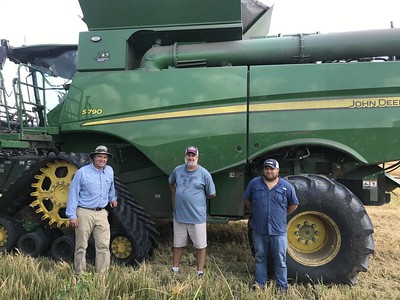‘Most Crop Per Drop’ contest rewards Arkansas producers for water efficiency
Jan. 26, 2023
By Tracy Courage
U of A System Division of Agriculture
Fast Facts:
- Irrigation Yield Contest promotes irrigation water management practices in corn, rice, soybean
- Winners determined by best water efficiency
- Winners share in more than $90,000 in cash, prizes
(588 words)
(Newsrooms: With photos of winners at https://flic.kr/s/aHBqjApFqk)
JONESBORO, Ark. — When it comes to the annual Arkansas Irrigation Yield Contest, less
is always more.
The annual University of Arkansas System Division of Agriculture program — referred to as “Most Crop per Drop” — promotes the use of irrigation management practices and rewards growers who demonstrate the highest water use efficiency in growing corn, rice and soybean.
Winners were announced Jan. 25 during the 34th annual Arkansas Water and Soil Education Conference in Jonesboro. This year’s top winners share something in common: They’ve all previously won top honors in another crop category. This year, the top three finishers in each crop category each received more than $20,000 in cash and prizes from industry sponsors.
“The contest is an opportunity for farmers to explore their individual aptitude to reduce energy, water use, labor and improve profitability,” said Chris Henry, associate professor and water management engineer for the Division of Agriculture.
Last year, 29 producers from 16 counties throughout the Arkansas Delta competed. Two of the growers entered multiple crops and fields. Each producer — except for flooded rice entries — used at least one irrigation management tool such as computerized hole-selection, multiple-inlet rice irrigation, soil moisture sensors or surge irrigation.
Jefferson County producer Chad Render has competed four years. On his first try, he didn’t place; the following year he won the corn category after using Delta Plastics’ Pipe Planner program, watermark sensors and cover crops, all of which aid in conservation efforts. Last year, he won the soybean category, and this year he took top honors in the furrow rice category. He is also the overall winner in the rice division.
“Chad has become comfortable with managing his water and not overwatering,” said Russ Parker, a program associate based at the Rice Research and Extension Center, part of the Arkansas Agricultural Experiment Station. “He’s very involved personally in scheduling the irrigation of his fields.”
Mississippi County producer Cody Fincher, who farms in Dyess, previously won first place in rice last year, and is this year’s soybean winner. He achieved a water use efficiency of 4.25 bushels per inch – the highest water use efficiency since the contest began five years ago.
Newcomers Rieves Wallace and his father John Wallace of Crittenden County placed in three crop categories: second place in row rice and soybean, and third place in flooded rice.
Corn Winners
1st place — James Wray, 12.43 bushels/inch, Poinsett County
2nd place — Heath Donner, 7.23 bushels/inch, Mississippi County
3rd place — Terry Smith, 6.11 bushels/inch, Greene County
Soybean winners
1st place — Cody Fincher, 4.25 bushels/inch, Mississippi County
2nd place — Rieves Wallace and John Wallace, 3.65 bushels/inch, Crittenden County
3rd place — Karl Garner, 3.57 bushels/inch, Cross County
Flooded Rice Winners
1st place — Karl Garner, 7.66 bushels/inch, Cross County
2nd place — Mark Felker, 6.56 bushels/inch, Crittenden County
3rd place — Rieves Wallace and John Wallace, 4.57 bushels/inch, Crittenden County
Furrow Rice Winners
1st place — Chad Render, 7.94 bushels/inch, Jefferson County
2nd place — Rieves and John Wallace, 6.38 bushels/inch, Crittenden County
3rd place — Matt Morris, 6.22 bushels/inch, Lonoke County
The first-place winners in corn and soybean received $8,000 each; second-place winners, $3,000; and third-place winners, $1,000. The overall rice winner received $2,000 and a Ricetec seed credit worth $11,000.
All winners collectively shared in more than $90,000 in cash and equipment prizes provided by Ricetec, the Arkansas Corn and Grain Sorghum Promotion Board, the Arkansas Soybean Promotion Board, McCrometer, Seametrics, Delta Plastics, Irrometer, Trellis, FarmLogs, Agsense and CropX.
For information about irrigation and how to get involved with the 2023 Most Crop per Drop contest, visit https://uaex.uada.edu/irrigation.
To learn about extension programs in Arkansas, contact your local Cooperative Extension Service agent or visit www.uaex.uada.edu. Follow us on Twitter and Instagram at @AR_Extension. To learn more about Division of Agriculture research, visit the Arkansas Agricultural Experiment Station website: https://aaes.uada.edu/. Follow on Twitter at @ArkAgResearch. To learn more about the Division of Agriculture, visit https://uada.edu/. Follow us on Twitter at @AgInArk.
About the Division of Agriculture
The University of Arkansas System Division of Agriculture’s mission is to strengthen agriculture, communities, and families by connecting trusted research to the adoption of best practices. Through the Agricultural Experiment Station and the Cooperative Extension Service, the Division of Agriculture conducts research and extension work within the nation’s historic land grant education system.
The Division of Agriculture is one of 20 entities within the University of Arkansas System. It has offices in all 75 counties in Arkansas and faculty on five system campuses.
Pursuant to 7 CFR § 15.3, the University of Arkansas System Division of Agriculture offers all its Extension and Research programs and services (including employment) without regard to race, color, sex, national origin, religion, age, disability, marital or veteran status, genetic information, sexual preference, pregnancy or any other legally protected status, and is an equal opportunity institution.
# # #
Media Contact:
Tracy Courage
Director of Communications-Extension
U of A System Division of Agriculture
501-658-2044
